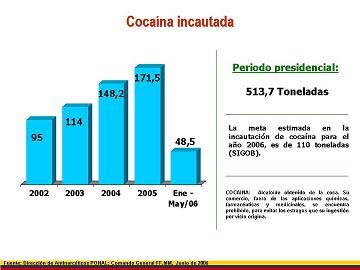« Rural development, in 400 words or less | Main | Demobilizations: troubling official data about a troubled process »
June 16, 2006
A mysterious drop in cocaine seizures
Colombia's security forces interdicted 48.5 tons of cocaine between January and May of this year, according to a press release that appeared Wednesday on the Colombia's presidency's website.
This sounds impressive, but it actually puts Colombia on a pace to interdict one-third less cocaine than it did in 2005. In 2005, Colombia seized 171 tons - a record, though merely a fraction of the 545 tons that were produced in Colombia last year, according to the U.S. Drug Czar's conservative estimate.
 At this year's rate, Colombia will have seized about 116.4 tons of cocaine by December 31. After years of increased interdiction levels, this would represent a drop to 2003 levels. 116.4 tons is only slightly more than Colombia seized in just the first seven months of last year (108.3 tons between January and July of last year, according to an August 2005 communiqué from the Colombian presidency).
At this year's rate, Colombia will have seized about 116.4 tons of cocaine by December 31. After years of increased interdiction levels, this would represent a drop to 2003 levels. 116.4 tons is only slightly more than Colombia seized in just the first seven months of last year (108.3 tons between January and July of last year, according to an August 2005 communiqué from the Colombian presidency).
Why is so much less cocaine being seized, especially when U.S. anti-drug military aid to Colombia remains constant or even increasing? We don't know, but there are three leading explanations. Two of them are obvious and one is alarming, though impossible to dismiss.
1. Colombian authorities are simply finding less of the product. It is possible that Colombian traffickers, after years of increasing losses, have adapted and are using new routes and new methods of getting cocaine out of the country.
2. Colombian coca-growers are producing less of the product, thanks to eradication. This outcome is unlikely, though, since U.S. governmnent figures show that coca-growing has been steady, if not increasing, for many years now.
3. The big paramilitary pre-demobilization "sell-off" is over. Last year, Colombian officials speculated that the cocaine market was being flooded by paramilitary leaders who, facing imminent demobilization, were selling off their cocaine stockpiles, rushing to convert it to cash before being amnestied. This could explain the spike in cocaine seizures in 2005 - including a surprising number of multiple-ton finds - though it is less likely to explain a similar spike in 2004, when a final agreement with the paramilitaries was still far off.
If this hypothesis is true, however, it might explain why less cocaine might be "in the pipeline" now that the paramilitary leadership is officially "demobilized." And more disturbingly, it means that top paramilitary leaders, who appear likely to avoid extradition to the United States for sending drugs here, successfully managed to cash in one last time. They may have gotten away with sending even more tons of drugs here just before the final deadline for submitting to the "Justice and Peace" law.
Posted by isacson at June 16, 2006 4:30 PM
Trackback Pings
TrackBack URL for this entry:
http://ciponline.org/cgi-bin/mt-tb.cgi/251
Comments
There is a another hypothesis to explain why there was less cocaine seized during the last five months. It is possible that the illegal flow of cocaine was less controled and interdicted; in this case we are talking about a more efficient capacity, on the side of the drug dealers, to corrupt the Colombian authorities.
Posted by: Colombia Hoy at June 19, 2006 10:26 AM
Mr. Colombia Hoy: In the realm of possibilities, all hypotheses are equal, but in practice, I'd say that factor has generally remained constant all these years.
By itself, I don't think it can entirely explain the current phenomenon, since systemic corruption has been pretty much a given for a long time already.
The other factors pointed out by Mr. Isacson appear to be more comprehensive (I don't believe that they are all mutually exclusive either).
Posted by: jcg at June 20, 2006 2:23 PM
Post a comment
Thanks for signing in, . Now you can comment. (sign out)
(If you haven't left a comment here before, you may need to be approved by the site owner before your comment will appear. Until then, it won't appear on the entry. Thanks for waiting.)